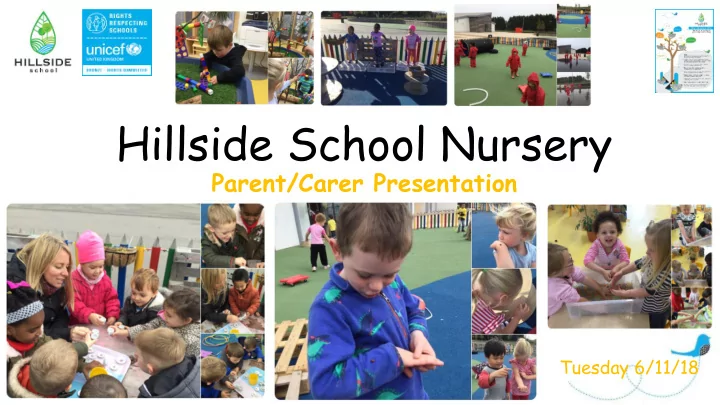

Hillside School Nursery Parent/Carer Presentation Tuesday 6/11/18
Aims To give parents/carer more information about: -our setting incl. our improvement priorities -the curriculum and how children learn at Hillside -our plan to implement home learning packs
Inspection Inspection – March 2018 (HMIe and Care Inspectorate) *Findings published in May 2018 https://education.gov.scot/inspection-reports/aberdeenshire/1003607 OR Google – Hillside School, Education Scotland Hillside Nursery Class summarised inspection findings, Portlethen - 22/05/18
Nursery Improvement Plan 2018-19 *Learning and Teaching *Literacy Wellbeing Nursery specific priority To develop a nursery curriculum rationale
Play There is no need to formalise the curriculum; or implement a list of experiences to reflect the early stages... If this happens it is likely to narrow the young child’s experiences. Building the Ambition
Play Wellbeing Communication Social skills Imagination Curiosity, inquiry and creativity…
Environment We aim for our children to learn through stimulating environments indoors and outdoors. -Children should be able to follow their own learning paths through play and multisensory provisions -Not about specific, focused activities with a limited intention in mind
Enabling Environment • Space to play • Well resourced to support literacy and numeracy/maths inquiry, curiosity and creativity (incl. open ended resources) • Possibilities for exploration of literacy and numeracy/maths- which could develop in a variety of ways • Links to the ‘real world’
Looking for learning • Practitioner’s role • Varied ways of responding to children’s interactions within the environment
Block play
Children’s Development
Literacy
Phonological Concepts Awareness of Print Oral Fine Motor Language Skills
www.readwritecount.scot Concepts of Print
Rhyme of the Week
PHONOLOGICAL AWARENESS November 2018 L Lamb
Definition of Phonological Awareness • Phonological awareness is an individual's awareness of the phonological structure, or sound structure of words. • Phonological awareness is an important and reliable predictor of later reading ability
Areas of Phonological Awareness • Listening and Attention • Visual and Auditory Memory • Auditory Discrimination and word boundaries • Rhyme Awareness and Production • Syllable Blending and Detection • Onset and Rime • Alliteration • Phoneme blending and segmentation • Number and counting skills
HTTPS://HIGHLANDLITERACY.COM
Phonological Awareness WHY? • Necessary to develop pre reading, writing AND numeracy skills • Making learning fun • Making learning exciting HOW? • Pilot scheme using books, games and activities aimed at developing aspects of phonological awareness which you can share and enjoy with your child at home.
Home packs Trial to take place in term 2 (November 2018) 4 week trial, focusing on a different nursery class each week e.g. Week 1 – Squirrels Week 2 – Otters Week 3 – Badgers Week 4- Hedgehogs
Parental Involvement Home packs Care Plan meetings – term 1 and 3 1:1 meeting with parents/carers for preschool children – term 4 Christmas sing-a-long Sports day Presentations/workshops Stay and play Profiles Newsletter – once per term Email, Twitter Question/Policy of the month Suggestion box Open door policy
Recommend
More recommend